Sleep disorders cause all sorts of problems, and are more common than most people realize. Dr. Jennifer J. Cornell, DDS, at Dental Sleep and TMJ Solutions of Clarksville has answers to some of the questions that come up about the conditions preventing you from getting a good night’s sleep.
Question: I do a lot of traveling with my job and for fun. It can be such a pain to take my CPAP machine with me, not to mention if there is no power supply to plug into. How effective are the dental devices made to treat sleep apnea?
Answer: Dental devices, often called mandibular advancement devices (MADs) or oral appliance therapy, can be quite effective for treating obstructive sleep apnea (OSA) in many cases. Here’s how they work and their effectiveness:
How they work:
- Mandibular Advancement Devices (MADs): These devices are designed to reposition the lower jaw (mandible) and tongue forward. This adjustment helps keep the airway open during sleep, reducing or eliminating the apnea episodes.
Effectiveness:
- Severity of sleep apnea: MADs are generally most effective for mild to moderate obstructive sleep apnea. For severe cases, continuous positive airway pressure (CPAP) therapy might still be the preferred treatment. Combination therapy with oral appliances can sometimes be used to make CPAP more tolerable.
- Comfort and compliance: Many people find MADs more comfortable and easier to use than CPAP machines. This can improve adherence to treatment, which is crucial for effectiveness. And they are easily portable with no needed power supply!
- Clinical success rates: Studies show that MADs can reduce or eliminate apneas in a significant number of patients, and they can also improve related symptoms such as daytime sleepiness and quality of sleep.
- Side effects and adjustments: Some people may experience side effects like jaw pain, tooth discomfort, or changes in bite. These can be minimized by finding a dentist with further training and certification on how to properly fit and titrate the appliance over time. Many of the documented side effects arose because patients purchased “do it yourself” appliances off the internet and set their jaw position incorrectly.
- Long-term management: Regular follow ups with your dentist, the qualified dentist who made the appliance, and even the sleep physician who diagnosed the disorder are important. Dental check-ups are important to assure the mouth is healthy and if there is any major dental work completed this could affect the fit of the appliance. These devices are not magic pieces of plastic and should be managed and followed by properly trained healthcare professionals.
- Choosing the right treatment: The effectiveness of a dental device can vary based on individual factors, including the severity of sleep apnea and anatomical differences. A sleep physician and/or dental sleep medicine trained dentist can help determine whether an oral appliance is suitable for you and can monitor its effectiveness over time.
At Dental Sleep & TMJ Solutions of Clarksville. we have been treating sleep-related breathing disorders for close to 15 years. Dr. Cornell is recognized in dental sleep medicine by the American Board of Dental Sleep Medicine and works closely with other sleep professionals in the area to assure the patient receives the best optimal care possible. For more, visit the Dental Sleep and TMJ Solutions of Clarksville website or call 931-645-8000.


